外研版七年级英语下册模块10知识点归纳
外研社英语七年级下册Module10知识点-语法点-练习试题(含答案)教学内容
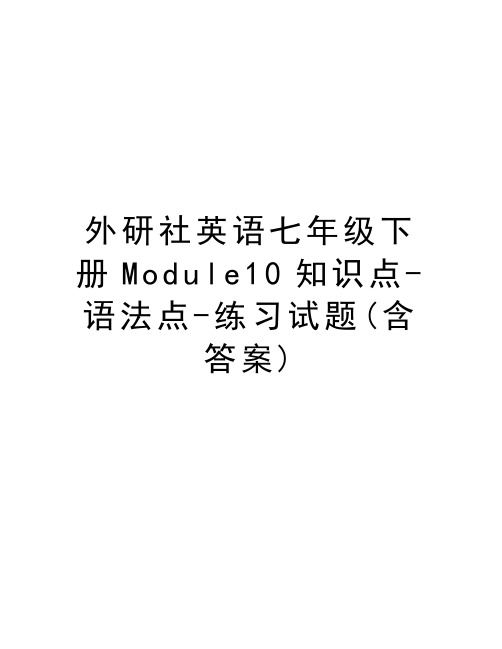
外研社英语七年级下册M o d u l e10知识点-语法点-练习试题(含答案)知识图谱Module 10 A holiday journey知识精讲一、必背词汇Pacific [pə'sɪfɪk] adj. 太平洋的guess [ges] v. 猜; 猜测excited [ɪk'saɪtɪd] adj. 激动的; 兴奋的arrive [ə'raɪv] v. 到达relax [rɪ'læks] v. 放松world-famous adj.举世闻名的sell [sel] v. ( sold ) 卖; 出售French [fren(t)ʃ] adj. 法国的; 法语的n. 法国人; 法语top [tɒp] n. 顶端till [tɪl] conj. 直到……为止light [laɪt] n. 电灯wonderful ['wʌndəfʊl] adj. 绝妙的; 了不起的palace ['pælɪs] n. 宫殿二、重点词汇1. pacific adjective & noun /pəˈsɪf.ɪk/1). adj. peaceful or helping to cause peace和平的;平静的例句:The night was pacific.黑夜静悄悄的。
He developed a pacific disposition in his childhood.童年时他养成了温和的性情。
2). n. Pacific Ocean 太平洋例句:The spacecraft splashed down in the Pacific.那艘宇宙飞船溅落在太平洋中。
They must think you are a madman if you tell them you want to cross the Pacific on a raft.如果你告诉他们你要乘木筏横渡太平洋,他们一定会认为你是个疯子。
七年级英语下册Module10Aholidayjourney语法知识汇总复习外研版4

Module 10 A holiday journey语法精选1. so 那么;因此;如此(1)so作副词,意为“那么(尤指用于引出新话题);这么,那么(用于强调质量、感觉或数量)”。
如:①Don’t be so w orried. 别这么担心。
②So what did you do in Los Angeles?那么你在洛杉矶做了什么?so作副词还意为“(指刚说过的事物)这样;如此”。
如:—Is he coming? 他来吗?—I hope so. 我希望如此。
(2)so作连词,意为“所以;因此”。
如:I like travellin g, so I like holidays.我喜欢旅游,所以我喜欢假期。
2. excite, excited与exciting(1)excite是动词,意为“使……激动”;excited是形容词,意为“激动的;兴奋的”,修饰人。
如:The woman is so excited when she sees her lost boy.当她看到她丢失的孩子时,那个女人是如此激动。
(2)exciting是形容词,意为“令人激动的;令人兴奋的”,修饰物。
如:The news is exciting.那个消息是令人激动的。
句法精析1. Guess what?你猜怎么着?用于向对方讲述一件自己认为会让对方感到惊讶的事情之前,字面意思是让对方猜,但通常是紧接着说出想说的事情。
如:—You look so excited!你看起来很兴奋!—Guess what? I won a computer.你猜怎么着?我赢了一台电脑。
2. I hope y ou like it. 我希望你喜欢它。
hope意为“希望”,它有许多种用法。
(1)hope用作及物动词,意为“期望;希望”,后面可接不定式或宾语从句。
如:Tom hopes to hear from you soon.=Tom hopes he can hear from you soon.汤姆希望尽快收到你的来信。
外研版七年级下册Module 10 life history知识点

Module 10 life history1、节日英语表达阳历节日:1月1日元旦(New Y ear's Day)2月14日情人节(V alentine's Day)3月8日国际妇女节(International Women' Day)4月1日愚人节(April Fools' Day)4月5日清明节(Tomb-sweeping Day)4月7日世界卫生日(World Health Day)4月22日世界地球日(World Earth Day)5月1日国际劳动节(International Labor Day/May Day)5月8日世界红十字日(World Red-Cross Day)6月1日国际儿童节(International Children's Day)6月5日世界环境日(International Environment Day)7月11日世界人口日(World Population Day)8月1日中国人民解放军建军节(Army Day)9月10日中国教师节(Teachers' Day)10月1日中华人民共和国国庆节(National Day)12月1日世界爱滋病日(World AIDS Day)12月3日世界残疾人日(World Disabled Day)12月25日圣诞节(Christmas Day)5月第二个星期日母亲节(Mother's Day)6月第三个星期日父亲节(Father's Day)10月的第二个星斯一加拿大感恩节(Thanksgiving Day)11月最后一个星期四美国感恩节(Thanksgiving Day)农历节日农历正月初一春节(the Spring Festival)农历正月十五元宵节(Lantern Festival)农历五月初五端午节(the Dragon-Boat Festival)农历七月初七乞巧节(中国情人节)(Double-Seventh Day)农历八月十五中秋节(the Mid-Autumn Festival)农历九月初九重阳节(the Double Ninth Festival)2、并列人称代词的排列顺序1) 单数人称代词并列作主语时,其顺序为:第二人称-> 第三人称-> 第一人称you -> he/she;it -> IY ou, he and I should return on time.2) 复数人称代词作主语时,其顺序为:第一人称-> 第二人称-> 第三人称we->you->They注意:在下列情况中,第一人称放在前面。
外研版七年级下册英语Module10 A holiday journey知识点
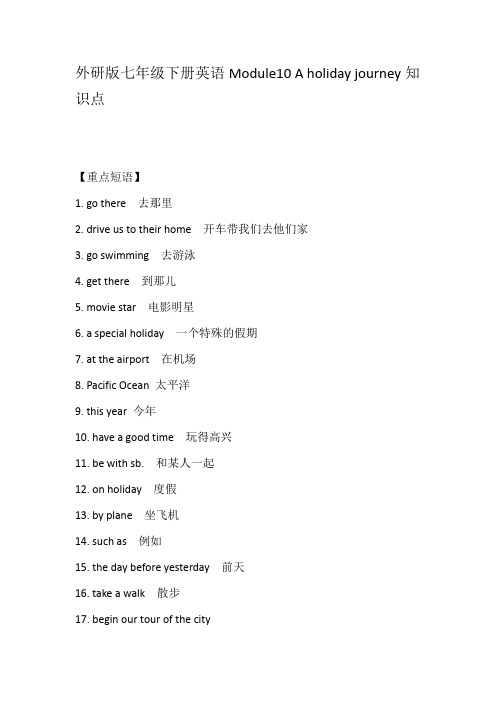
外研版七年级下册英语Module10 A holiday journey知识点【重点短语】1. go there 去那里2. drive us to their home 开车带我们去他们家3. go swimming 去游泳4. get there 到那儿5. movie star 电影明星6. a special holiday 一个特殊的假期7. at the airport 在机场8. Pacific Ocean 太平洋9. this year 今年10. have a good time 玩得高兴11. be with sb. 和某人一起12. on holiday 度假13. by plane 坐飞机14. such as 例如15. the day before yesterday 前天16. take a walk 散步17. begin our tour of the city开始这个城市的旅行18. the Eiffel Tower 埃菲尔铁塔19. many world-famous works of art许多世界著名的艺术品20. first of all 首先21. wait in line 排队等候22. at the station 在车站23. do different things 做不同的事情24. spend all day 花整天时间25. take lots of photos 照许多照片26. go with sb. 与某人一起去【重点句型】1. —Where are you going on holiday, Tony?你打算去哪儿度假,托尼?—To Los Angeles. 去洛杉矶。
2. I went there two years ago and enjoyed it a lot. 我两年前去过,玩的很开心。
3. How long did it take to get there?你花了多长时间去那里?4. Then our friends met us and drove us to their home. 然后我们的朋友去接我们,开车带我们到他们家。
外研版英语七年级下册 module 10重要知识点
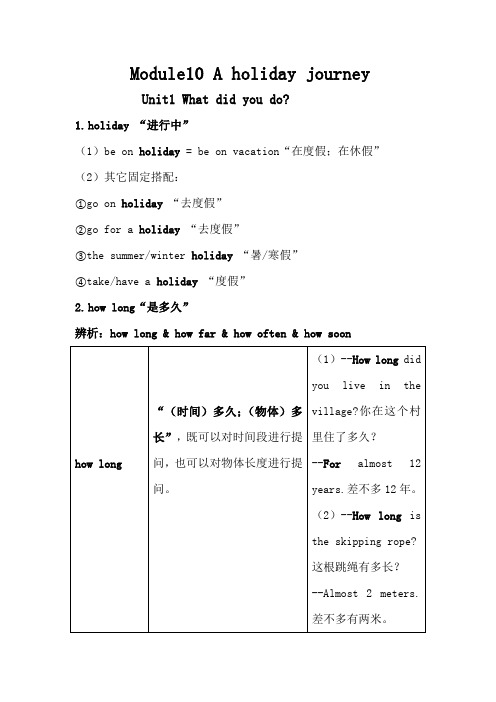
Module10 A holiday journeyUnit1 What did you do?1.holiday “进行中”(1)be on holiday = be on vacation“在度假;在休假”(2)其它固定搭配:①go on holiday“去度假”②go for a holiday“去度假”③the summer/winter holiday“暑/寒假”④take/have a holiday “度假”2.how long“是多久”辨析:how long & how far & how often & how soon3.take用法辨析:take & spend(1)take常用句型It takes/took (sb.)some time to do sth. “做事花费(某人)多少时间”,其中it代替to do sth.,做句子的形式主语,而句子的真正主语是不定式短语to do sth.(2)spend常用句型①sb.spends/spent some time/monet on sth. “某人在某事上花了多少时间/金钱”。
②sb.spends/spent some time/money (in) doing sth. “某人花费多少时间/金钱做某事”一言辨异:It won’t take you much time to finish the work and you just need to spend about 15 minutes on it.完成这项工作不会花费你很多时间,你只需要花费大约15分钟左右即可。
4.“如此,那么的”so(1)用作连词,“这么;那么;这么看来”。
So you promise to help us to finish the work?那么你的意思是你答应帮助我们完成这项工作喽?(2)用作连词,“因此;所以”,引导结果状语从句。
英语:Module10详细解析(外研社七年级下)

第10模块知识总结[网络构建]本模块以生活经历为话题,主要以英国著名剧作家莎士比亚的生活经历为题材,借此让学生了解这位在英国文坛中有重要影响的文豪,其阅读课文是传记文体。
通过开展听、说、读、写方面的语言实践活动展示一般过去时的应用,在在使用语言的过程中学习语言。
语法难点仍是一般过去时的句中动词的用法。
通过对自己和他人生活经历的描述掌握一般过去时第10模块综合检测题(时间:60分钟满分:100分)一、找出一列各组单词画线部分读音不同的一个。
(5分)1. A. how B. cow C. low D. flower2. A. with B. something C. there D. the3. A. ski B. twin C. little D. swim4. A. jump B. run C. ruler D. number5. A. look B. football C. too D. good答案:C B A C C二、根据句意或首字母提示写单词。
(10分)6. T__________ comes after Monday.7. Li Lei is a tall boy. His legs are very l__________.8. O__________ of your hands is dirty (脏的). You must wash it.9. T__________ the basketball to me, please.10. I’m not good at p__________ ba sketball, but I do well in English.答案:6. Tuesday 7. long 8. One 9. Throw 10. playing三、下面的每个句子中含有一处错误,请找出并更正。
(10分)11. Could I have one full, please?’12. I have two brothers. One is called Tom and other is called Jack.13. Let’s go and play a basketb all.14. Don’t it like that, do it like this.15. I don’t have some ice cream.答案:11.把one full改为a full one 解析:full是形容词,修饰代词,放在其前。
外研新版英语-七年级下册(Module10A holidy journey)知识点及练习
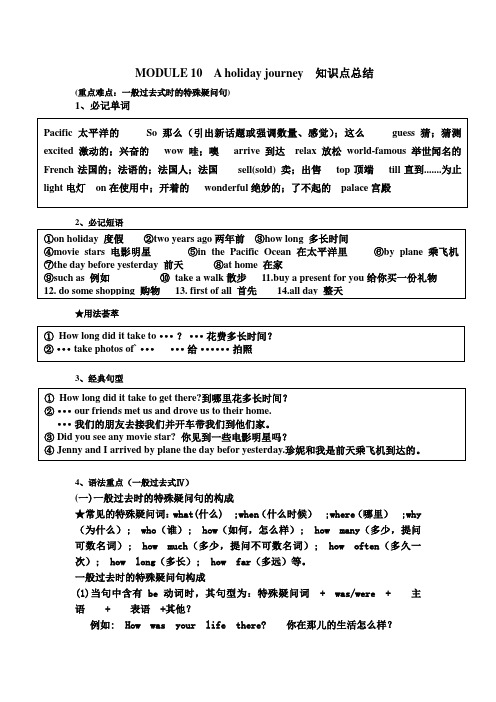
MODULE 10 A holiday journey 知识点总结(重点难点:一般过去式时的特殊疑问句)1、必记单词★用法荟萃3、经典句型4、语法重点(一般过去式Ⅳ)(一)一般过去时的特殊疑问句的构成★常见的特殊疑问词:what(什么) ;when(什么时候) ;where(哪里) ;why (为什么); who(谁); how(如何,怎么样); how many(多少,提问可数名词); how much(多少,提问不可数名词); how often(多久一次); how long (多长); how far(多远)等。
一般过去时的特殊疑问句构成(1)当句中含有be动词时,其句型为:特殊疑问词 + was/were + 主语 + 表语 +其他?例如: How was your life there? 你在那儿的生活怎么样?(2)当句子中有情态动词时,其句型为:特殊疑问词 + 情态动词 + 主语 + 动词原形 + 其他?例如:What could you do when you were five years old?你五岁时会做什么?(3)当句中有实义动词时,其句型为:特殊疑问词 + did + 主语 + 动词原形 + 其他?例如:When did you do your homework?你昨天什么时候做的作业?(4)当疑问词在句中作句子的主语时,其句型为:特殊疑问词 + be动词的过去式/实义动词的过去式 + 其他?例如:What made you so happy? 什么使得你如此高兴?第10模块A holiday journey综合检测题(时间:60分钟满分:100分)一、用所给词的正确形式填空1. My teacher always ________(say), “If you have some questions,please ________(put) up your hands.”2. The boy ________(stop) outside the wooden house and looked inside.3. He ________(be) alone at home this morning.4. What do you decide ________(do) during the holiday?5. I hope ________(finish) my task in time.6. It usually take me 30 minutes ________(walk) to my school.二、单词拼写1. We are going to Disneyland for a h________ this summer.2. —How l________ did you stay here?—About three hours.3. She didn't like to go shopping w________ her mother.4. Every morning,my grandpa r________ newspapers.5. They will meet me at the a________.三、选词填空1. —How much money do you ________ each week?—Twenty yuan.2. I ________ to go to Australia one day.3. —What's that?—It's a ________. It can tell us the time.4. Today is Saturday and ________ will be Sunday.5. I often ________ with my mother on Sundays.四、单项选择1. How ________ your birthday party,Alice?A. isB. wasC. doesD. did2. A few minutes later,a car came and ________ the man to the hospital.A. bringsB. broughtC. takesD. took3. He is too lazy. He doesn't want to do .A. somethingB. anythingC. nothingD. everything4. When he ________ young,there ________ not so much food for him.A. is;isB. was;wasC. is;wasD. was;is5. It's hard ________ tickets over the weekend.A. getB. getsC. gettingD. to get五、用括号中所给动词的适当形式填空(每空一词)Li Lei likes__1__(walk). He usually __2__(go) for a walk after his father __3__(come) back from work. Li Lei __4__(like) water very much. He often throws (扔) his toys into the water. He __5__(play) with water and sometimes he __6__(be) wet all over. His mother says, “You may __7__(become) fish someday,I think.” Li Lei is very glad,“Yes,I like fish very much because fish can __8__(swim).”One Sunday morning,Li Lei and his father __9__(go) to a park with his father. There __10__(be) many trees and flowers in the park. There __11__(be) a lot of people in the park. Some of them are sitting at the tables and __12__(have) tea or drinks. There is a big swimming pool (游泳池) in the middle of the park. A few people are __13__ (swim) in it. Li Lei asks his father to __14__ (take) him to the pool. “Why do you __15__ (want) to go there?” asks his father. “I want to __16__(learn) swimming,” answers Li Lei. “And you can __17__(teach) me,I think.”“You are too young. And I'm sorry I can't swim,” his father says.“You can't swim?Liu Dong's father __18__ (swim) very well. Why can't you swim?”“His father likes __19__(eat) fish. So he swims very well,” says the father.“Oh,I see,” says Li Lei. “But you like eating chicken very much. Can you lay eggs (下蛋)?” __20__(ask) Li Lei.1、________2、________3、________4、________5、________6、________7、________8、________9、________10、________ 11、________ 12、________ 13、________ 14、________ 15、________16、________ 17、________ 18、________19、________ 20、________六、阅读理解( A )There is a one-day holiday in most countries on New Year's Day. The real celebration for New Year happens on the night before—on New Y ear's Eve. There are several interesting customs in the West,and there are many differences from country to country.Though Christmas is a time for family to get together,New Year for some people is a time to be with friends,too. Parties are often held (举行) to welcome New Year. At such parties,there is food and drink and dancing until the time nears for the coming of New Year.At midnight,people often say “Happy New Year” to each other,Champagne (香槟酒) is a favourite drink for New Year. In many Western countries fireworks are let off at midnight,and many people like to make a noise,possibly to drive away bad spirits.One important song at New Year is the Scottish song of Auld Lang Syne (good time long ago).1. People usually have great celebrations for New Year on ________.A. the night before New Year's EveB. New Year's DayC. the night before New Year's DayD. the night of New Year's Day2. In the West,New Year is also a time for ________.A. people to go from country to countryB. people to have a week's holidayC. friends to write to each otherD. friends to get together3. The Chinese meaning of the word “customs” is ________.A. 聚会B. 习俗C. 活动D. 饮食4. At midnight on New Year's Eve,Western people often ________.①hold parties to welcome New Year②make a noise to drive away bad spirits③say “Happy New Year” to each other④drink ChampagneA. ①②③B. ①②④C. ①③④D. ②③④( B )Arctic fox(北极狐) is a kind of small fox that lives in the Arctic. It grows about 50 centimeters long, not including its tail, 30 centimeters tall and weighs from 3 to 7 kilos.The Arctic foxes are white or blue in color. The white ones are white in winter, but grey-brown in summer. The blue ones are blue-grey all year round. The Arctic foxes have long, thick hair that is called fur. And the long fur covers their whole bodies, including both their cat eyes and rabbit feet, to keep them warm in the low temperature in the Arctic.The Arctic foxes feed mainly on birds, birds’ eggs and other small animals. Teamwork is the way they look for food, and they don’t like to do that alone.Baby Arctic foxes are very lovely. They don’t open their eyes until a week after their birth. For the first half of the year, their parents offer them food. They begin to look for food on their own when they are about six months old. The next year they can live alone.Today, the number of the Arctic foxes is becoming smaller and smaller, because people kill them for their fur to make beautiful coats for money. Something must be done to protect the Arctic foxes.根据短文,判断对(T)错(F)1.Not all the Arctic foxes change their colors in different seasons.()2. The Arctic foxes have rabbit eyes and cat feet.()3. Baby Arctic foxes are born with their eyes open.()4. Birds, birds’ eggs and other small animals are the main food for the Arctic foxes.()。
(完整word版)外研社七年级英语下册Module10-A-holiday-journey知识点复习

MODULE 10 A Holiday Journey1.短语:2.go there 到那里3.enjoy…a lot 非常喜欢… a lot 很, 非常4.drive sb.to…开车送某人去…5.go back to our family home 回到我们家到达: arrive 不及物动词, 接here ,there, home等地点副词时省略介词。
arrive in+大地点arrive in Chinaarrive at +小地点arrive at the schoolarrive homeget 不及物动词get to +地点接地点副词时, 省略toreach 及物动词reach+地点6.the day before yesterday 前天the day after yesterday 后天7.at the airport 在机场8.works of art 艺术作品9.such as 例如10.have dinner 吃晚饭11.take a walk 散步=go for a walk12.street market 街头市场13.do some shopping 购物14.buy…for sb.为…买…15.hope 希望没有hope sb to do sth 这一结构hope to do 希望做…hope +句子16.have to do...不得不做17.wait in line排队等候cut in line 插队18. a special holiday 一个特殊的假期19.Pacific Ocean 太平洋20.on holiday 度假on sale 出售on duty 在值日on leave 在休假on fire 着火21.at the station 在车站22.do different things 做不同的事情23.all day一整天= the whole day24.take lots of photos 照许多照片25.at the top of 在…顶端how long 表示“多久, 多长时间”, 用来提问时间的长短, 常用“for+一段时间”或“since+时间点/一段时间+ago”或“since+从句”作答。
外研版七年级下module 10基础知识
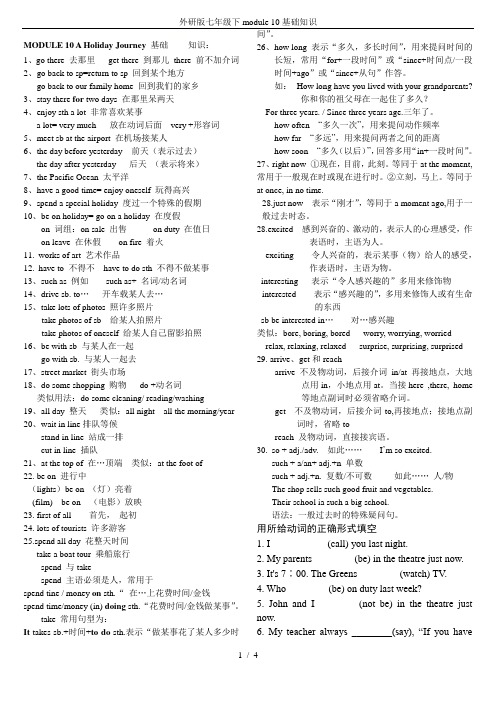
MODULE 10 A Holiday Journey基础知识:1、go there 去那里get there 到那儿there 前不加介词2、go back to sp=return to sp 回到某个地方go back to our family home 回到我们的家乡3、stay there for two days 在那里呆两天4、enjoy sth a lot 非常喜欢某事a lot= very much 放在动词后面very +形容词5、meet sb at the airport 在机场接某人6、the day before yesterday 前天(表示过去)the day after yesterday 后天(表示将来)7、the Pacific Ocean 太平洋8、have a good time= enjoy oneself 玩得高兴9、spend a special holiday 度过一个特殊的假期10、be on holiday= go on a holiday 在度假on 词组:on sale 出售on duty 在值日on leave 在休假on fire 着火11.works of art 艺术作品12.have to 不得不have to do sth 不得不做某事13、such as 例如such as+ 名词/动名词14、drive sb. to…开车载某人去…15、take lots of photos 照许多照片take photos of sb 给某人拍照片take photos of oneself 给某人自己留影拍照16、be with sb 与某人在一起go with sb. 与某人一起去17、street market 街头市场18、do some shopping 购物do +动名词类似用法:do some cleaning/ reading/washing19、all day 整天类似:all night all the morning/year20、wait in line排队等候stand in line 站成一排cut in line 插队21、at the top of 在…顶端类似:at the foot of22. be on 进行中(lights)be on (灯)亮着(film) be on (电影)放映23. first of all 首先,起初24. lots of tourists 许多游客25.spend all day 花整天时间take a boat tour 乘船旅行spend 与takespend 主语必须是人,常用于spend tine / money on sth.“在…上花费时间/金钱spend time/money (in) doing sth.“花费时间/金钱做某事”。
外研版七年级下册Module 10重点内容复习总结

外研版七年级下册module 10重点内容总结【语法】特殊疑问句的一般过去时在一般过去时中,特殊疑问句以疑问词开头,对句中某一成分提问。
常用的疑问词有:what(什么),who(谁),whose(谁的),which(哪个);when(什么时候),where(哪里),how(怎样),why(为什么)等。
如:①-When did he die?--He died in 1900.②—How did you get there?—I got there by plane.③—Where did you stay?—I stayed in a hotel.④—What did you do there?—I visited the Great Wall.⑤—Who did you go with?—I went with my parents.⑥--Why did he come back late?--Because he wanted to finished the work.⑦--How long did the rain last?--It lasted four hours.⑧—How long did you stay in Beijing?—I stayed there for a week.综上,我们发现一般过去时的特殊疑问句的用法与一般现在时的特殊疑问句在结构上没有太大的差异,只是使用的助动词不同而已。
【重点词汇】till prep. /conj. 直到……才【探究总结】till/until的用法区别until与till的意义相同,都表示“直到……;直到……才”,用作连词或介词,引导时间状语从句或表时间的短语。
(1)用在肯定句中时,主句的谓语动词一般是延续性的;(2)用在否定句中时,主句的谓语动词一般是终止性的。
◆We waited till all the lights were on. 我们一直等到灯全都亮了。
(完整word版)外研社七年级英语下册Module10 A holiday journey知识点复习

MODULE 10 A Holiday Journey短语:1.go there 到那里2.enjoy…a lot 非常喜欢… a lot 很,非常3.drive sb.to…开车送某人去…4.go back to our family home 回到我们家5.到达:arrive 不及物动词,接here ,there, home等地点副词时省略介词。
arrive in+大地点arrive in Chinaarrive at +小地点arrive at the schoolarrive homeget 不及物动词get to +地点接地点副词时,省略toreach 及物动词reach+地点6.the day before yesterday 前天the day after yesterday 后天7.at the airport 在机场8.works of art 艺术作品9.such as 例如10.have dinner 吃晚饭11.take a walk 散步=go for a walk12.street market 街头市场13.do some shopping 购物14.buy…for sb. 为…买…15.hope 希望没有hope sb to do sth 这一结构hope to do 希望做…hope +句子16.have to do... 不得不做17.wait in line排队等候cut in line 插队18. a special holiday 一个特殊的假期19.Pacific Ocean 太平洋20.on holiday 度假on sale 出售on duty 在值日on leave 在休假on fire 着火21.at the station 在车站22.do different things 做不同的事情23.all day一整天= the whole day24.take lots of photos 照许多照片25.at the top of 在…顶端26.how long 表示“多久,多长时间”,用来提问时间的长短,常用“for+一段时间”或“since+时间点/一段时间+ago”或“since+从句”作答。
外研版七年级英语下册模块10知识点归纳
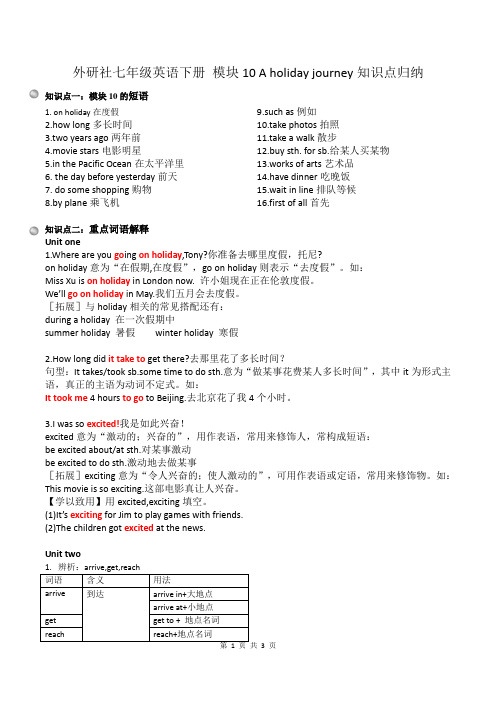
外研社七年级英语下册模块10 A holiday journey知识点归纳知识点一:模块10的短语1. on holiday在度假2.how long多长时间3.two years ago两年前4.movie stars电影明星5.in the Pacific Ocean在太平洋里6. the day before yesterday前天7. do some shopping购物8.by plane乘飞机9.such as例如10.take photos拍照11.take a walk散步12.buy sth. for sb.给某人买某物13.works of arts艺术品14.have dinner吃晚饭15.wait in line排队等候16.first of all首先知识点二:重点词语解释Unit one1.Where are you go ing on holiday,Tony?你准备去哪里度假,托尼?on holiday意为“在假期,在度假”,go on holiday则表示“去度假”。
如:Miss Xu is on holiday in London now. 许小姐现在正在伦敦度假。
We’ll go on holiday in May.我们五月会去度假。
[拓展]与holiday相关的常见搭配还有:during a holiday 在一次假期中summer holiday 暑假winter holiday 寒假2.How long did it take to get there?去那里花了多长时间?句型:It takes/took sb.some time to do sth.意为“做某事花费某人多长时间”,其中it为形式主语,真正的主语为动词不定式。
如:It took me 4 hours to go to Beijing.去北京花了我4个小时。
3.I was so excited!我是如此兴奋!excited意为“激动的;兴奋的”,用作表语,常用来修饰人,常构成短语:be excited about/at sth.对某事激动be excited to do sth.激动地去做某事[拓展]exciting意为“令人兴奋的;使人激动的”,可用作表语或定语,常用来修饰物。
外研版七年级英语下册Module 10模块知识点归纳

Module 10 A holiday journey必背单词1. excited adj. 激动的;兴奋的(常修饰人)→exciting adj.令人激动的;令人兴奋的(常修饰物)2. Pacific adj. 太平洋的3. so adv. 那么;这么4. guess v. 猜;猜测必背短语5. go on holiday 去度假6. how long 多长时间7. movie star 电影明星8. a lot 很,非常9. the Pacific Ocean 太平洋必背句子10. How long did it take to get there?到达那儿花了多长时间?11. Guess what?猜怎么着?12. I was so excited!我太激动了!13. It was great!太棒了!必背单词1. arrive v.到达→arrived(过去式)2. relax v.放松→relaxing adj.令人放松的(常修饰物)→relaxed adj.感到放松的(常修饰人)3. French adj. 法国的;法语的n. 法国人;法语→France n.法国4. sell v. 卖;出售→sold(过去式)5. till conj.直到……为止→until(同义词)6. world-famous adj. 举世闻名的7. top n. 顶端8. light n. 电灯9. on adv. 在使用中;开着的10. wonderful adj. 绝妙的;了不起的11. palace n. 宫殿必背短语12. the day before yesterday 前天13. at the airport 在机场14. do some shopping 购物15. wait in line 排队等候16. such as 例如必背句子17. We were tired so we relaxed at home and began our tour of the cityyesterday.我们累了,因此在家休息了一下,昨天才开始我们的城市之旅。
外研版七年级下册英语Module 10 语法知识点
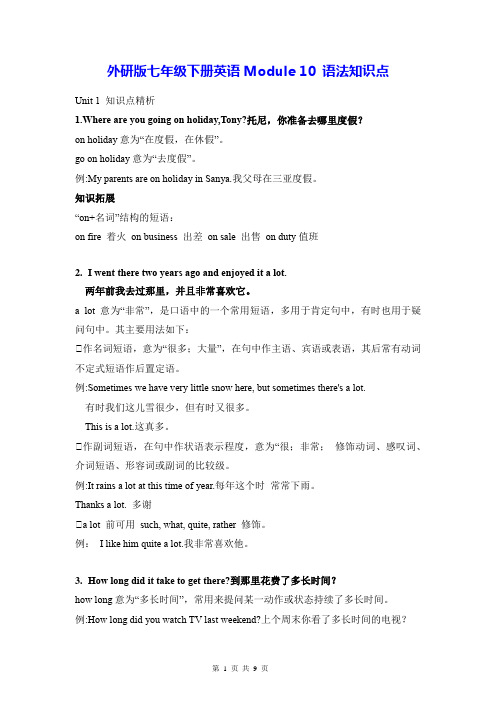
外研版七年级下册英语Module 10 语法知识点Unit 1 知识点精析1.Where are you going on holiday,Tony?托尼,你准备去哪里度假?on holiday意为“在度假,在休假”。
go on holiday意为“去度假”。
例:My parents are on holiday in Sanya.我父母在三亚度假。
知识拓展“on+名词”结构的短语:on fire 着火on business 出差on sale 出售on duty值班2.I went there two years ago and enjoyed it a lot.两年前我去过那里,并且非常喜欢它。
a lot 意为“非常”,是口语中的一个常用短语,多用于肯定句中,有时也用于疑问句中。
其主要用法如下:①作名词短语,意为“很多;大量”,在句中作主语、宾语或表语,其后常有动词不定式短语作后置定语。
例:Sometimes we have very little snow here, but sometimes there's a lot.有时我们这儿雪很少,但有时又很多。
This is a lot.这真多。
①作副词短语,在句中作状语表示程度,意为“很;非常;修饰动词、感叹词、介词短语、形容词或副词的比较级。
例:It rains a lot at this time of year.每年这个时常常下雨。
Thanks a lot. 多谢①a lot 前可用such, what, quite, rather 修饰。
例:I like him quite a lot.我非常喜欢他。
3.How long did it take to get there?到那里花费了多长时间?how long意为“多长时间”,常用来提问某一动作或状态持续了多长时间。
例:How long did you watch TV last weekend?上个周末你看了多长时间的电视?辨析:how long, how soon 与how oftenhow long“(历时)多长时间;多长”,可用于多种时态中,对时间段或物体长度进行提问how soon“多久以后”,常用于一般将来时中,对“in+一段时间“进行提问how often“多久一次”,常用于一般现在时中,对频率进行提问例:-How long did you live there?你在那儿住了多长时间了?-For seven years.7年了。
Module 10 A holiday journey-最新外研版七年级下册各模块知识点汇总
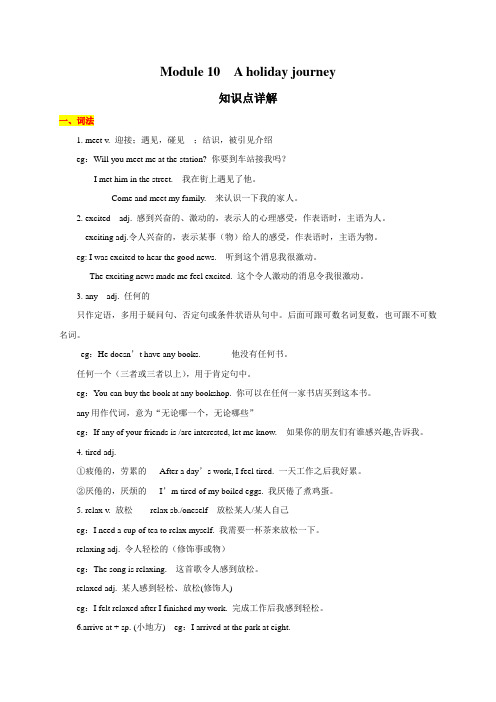
Module 10 A holiday journey知识点详解一、词法1. meet v. 迎接;遇见,碰见;结识,被引见介绍eg:Will you meet me at the station? 你要到车站接我吗?I met him in the street. 我在街上遇见了他。
Come and meet my family. 来认识一下我的家人。
2. excited adj. 感到兴奋的、激动的,表示人的心理感受,作表语时,主语为人。
exciting adj.令人兴奋的,表示某事(物)给人的感受,作表语时,主语为物。
eg: I was excited to hear the good news. 听到这个消息我很激动。
The exciting news made me feel excited. 这个令人激动的消息令我很激动。
3. any adj. 任何的只作定语,多用于疑问句、否定句或条件状语从句中。
后面可跟可数名词复数,也可跟不可数名词。
eg:He doesn’t have any books. 他没有任何书。
任何一个(三者或三者以上),用于肯定句中。
eg:You can buy the book at any bookshop. 你可以在任何一家书店买到这本书。
any用作代词,意为“无论哪一个,无论哪些”eg:If any of your friends is /are interested, let me know. 如果你的朋友们有谁感兴趣,告诉我。
4. tired adj.①疲倦的,劳累的After a day’s work, I feel tired. 一天工作之后我好累。
②厌倦的,厌烦的I’m tired of my boiled eggs. 我厌倦了煮鸡蛋。
5. relax v. 放松relax sb./oneself 放松某人/某人自己eg:I need a cup of tea to relax myself. 我需要一杯茶来放松一下。
外研版七年级下册英语Module10重点单词短语、句型、语法汇总

外研版七年级下册英语Module10重点单词短语、句型、语法汇总★重点单词1.w o r l d-f a m o u s举世闻名的2.o n h o l i d a y度假3.m o v i e s t a r电影明星4.t h e P a c i f i c O c e a n太平洋5.b y p l a n e乘飞机6.a t t h e a i r p o r t在机场7.s u c h a s比如8.t a k e p h o t o s照相9.t a k e a w a l k散步10.i n l i n e排队11.t a k e t h e u n d e r g r o u n d乘地铁12.r i g h t n o w立刻13.f i r s t o f a l l起初;首先14.d o s o m e s h o p p i n g购物15.t a k e a b o a t t o u r坐船游览★核心句型1.G u e s s w h a t?你猜怎么着?2.I t w a s g r e a t.太好了。
3.H o w l o n g d i d i t t a k e t o g e t t h e r e?到那儿花费了多长时间?4.I h o p e t h a t...我希望……5.W h a t d i d y o u d o?你做了什么?★语法点击在前几期中,我们学习了一般过去时的肯定句、否定句、一般疑问句及其回答。
那么今天我们就一起来学一下一般过去时的特殊疑问句吧。
一、特殊疑问句的构成1.疑问词+w a s/w e r e+主语+其他?如:W h y w a s P e t e r l a t e f o r s c h o o l a g a i n?彼得为什么上学又迟到了?W h e r e w e r e y o u t h i s a f t e r n o o n?今天下午你在哪里呢?2.疑问词+d i d+主语+实义动词原形+其他?如:W h a t d i d T o m d o y e s t e r d a y a f t e r n o o n?汤姆昨天下午做什么了?W h e n d i d y o u a r r i v e i n B e i j i n g?你们什么时候到北京的?二、常用的疑问词我们常见的疑问词有:1. w h a t意为“什么”,可单独使用,也可以与其他名词构成疑问词组,如:w h a t t i m e,w h a t c o l o u r,w h a t d a y等。
- 1、下载文档前请自行甄别文档内容的完整性,平台不提供额外的编辑、内容补充、找答案等附加服务。
- 2、"仅部分预览"的文档,不可在线预览部分如存在完整性等问题,可反馈申请退款(可完整预览的文档不适用该条件!)。
- 3、如文档侵犯您的权益,请联系客服反馈,我们会尽快为您处理(人工客服工作时间:9:00-18:30)。
外研社七年级英语下册模块10 A holiday journey知识点归纳知识点一:模块10的短语
1. on holiday在度假
2.how long多长时间
3.two years ago两年前
4.movie stars电影明星
5.in the Pacific Ocean在太平洋里
6. the day before yesterday前天
7. do some shopping购物
8.by plane乘飞机9.such as例如
10.take photos拍照
11.take a walk散步
12.buy sth. for sb.给某人买某物
13.works of arts艺术品
14.have dinner吃晚饭
15.wait in line排队等候
16.first of all首先
知识点二:重点词语解释
Unit one
1.Where are you go ing on holiday,Tony?你准备去哪里度假,托尼?
on holiday意为“在假期,在度假”,go on holiday则表示“去度假”。
如:
Miss Xu is on holiday in London now. 许小姐现在正在伦敦度假。
We’ll go on holiday in May.我们五月会去度假。
[拓展]与holiday相关的常见搭配还有:
during a holiday 在一次假期中
summer holiday 暑假winter holiday 寒假
2.How long did it take to get there?去那里花了多长时间?
句型:It takes/took sb.some time to do sth.意为“做某事花费某人多长时间”,其中it为形式主语,真正的主语为动词不定式。
如:
It took me 4 hours to go to Beijing.去北京花了我4个小时。
3.I was so excited!我是如此兴奋!
excited意为“激动的;兴奋的”,用作表语,常用来修饰人,常构成短语:
be excited about/at sth.对某事激动
be excited to do sth.激动地去做某事
[拓展]exciting意为“令人兴奋的;使人激动的”,可用作表语或定语,常用来修饰物。
如:This movie is so exciting.这部电影真让人兴奋。
【学以致用】用excited,exciting填空。
(1)It’s exciting for Jim to play games with friends.
(2)The children got excited at the news.
Unit two
词语含义用法
arrive 到达arrive in+大地点
arrive at+小地点
get get to + 地点名词
reach reach+地点名词
注意:当后面接地点副词,如home,here,there等时,arrive和get后面均不接介词,即arrive/get/reach+地点副词。
【学以致用】用arrive,get,reach的适当形式填空。
(1)I usually arrive/get/reach home at 5:30 in the afternoon.我通常下午5点半到家。
(2)We (will) arrive in Beijing on Friday.我们星期五到达北京。
(3)How does Zhang Ning get to school every day?张宁每天怎样去学校的?
(4)Please call me when you arrive.当你抵达的时候请打电话给我。
(5)They will reach the factory at 11 o’clock.他们11点将会到达工厂。
2.We were tired so we relaxed at home…我们很累,所以在家休息……
relax是动词,意为“放松;休息”,它的形容词有:relaxing adj.令人放松的(修饰物),relaxed
adj.感到放松的(修饰人)。
如:
(1)The music will help you to relax.音乐会使你感到轻松。
(2)I think dancing is a good relaxing way.我认为跳舞是个很好的放松方式。
(3)Ten minutes later,I was relaxed.十分钟后,我放松下来。
3.They sell such good fruit and vegetables.他们卖如此好的水果和蔬菜。
sell作动词,意为“卖;出售”,后常跟双宾语,构成短语:sell sb.sth./sell sth.to sb.,意为“卖给某人某物”。
如:
He sold me his bike.=He sold his bike to me.他把他的自行车卖给了我。
[拓展]sell out意为“卖完;售完”。
如:
The shop sold out all the bread.这家商店卖光了所有的面包。
4.We waited till all the lights were on.我们一直等到所有的灯都亮了。
till/until表示“直到……为止;直到……才”,用作连词或介词,引导时间状语从句或表时间的短语。
(1)用在肯定句中时,主句的谓语动词一般是延续性的,指某一动作或状态一直持续到till/until后面的句子所表示的时间为止。
如:
They slept till/until the alarm woke them.他们一直睡到闹钟响。
(2)用在否定句中时,主句的谓语动词一般是终止性的,指某一动作或状态一直到till/until后面的句子所表示的时间才开始。
如:
People don’t know the value of health till they lose it.直到失去健康,人们才知道健康的可贵。
知识点三:语法归纳:一般过去时(4)
前面我们学习了一般过去时的肯定、否定与一般疑问句的表达方式,但如果要问别人以前做了什么、到过哪里、事情发生的时间等时,又该如何表达呢?此时,我们就要用一般过去时的特殊疑问句形式。
先看下列例句:
—When was the meeting yesterday?昨天什么时候开的会?
—It was at 4:00 pm.下午4点。
—Where did you go last night?你昨晚去了哪里?
—I went to Tom’s home.我去汤姆家了。
由例句可见,一般过去时的特殊疑问句形式与一般现在时的特殊疑问句形式很相似,只是助动词或be动词改变而已。
因此,一般过去时的特殊疑问句结构为:特殊疑问词+ did/was/were +主语+动词原形+其他?即:特殊疑问句的句式=特殊疑问词+一般疑问句句式。
注意:必须关注助动词或be动词的时态和动词的还原。
